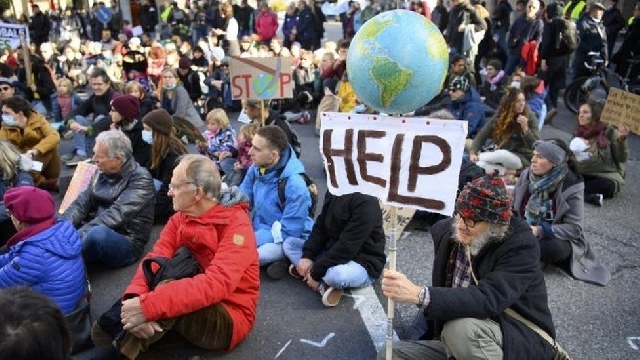COP26: Cautious welcome for unexpected US-China climate deal
 Protesters around the globe have been demanding firmer commitments from world leaders on climate change
Protesters around the globe have been demanding firmer commitments from world leaders on climate change
Activists and politicians have cautiously welcomed an unexpected US-China declaration that vowed to boost climate cooperation.
The EU and UN described the move as encouraging and an important step, but Greenpeace said both countries needed to show more commitment.
The US and China are the world's two biggest CO2 emitters.
They said they would work together to achieve the 1.5C temperature goal set out in the 2015 Paris Agreement.
Scientists say that limiting global temperature rises to 1.5C will help humanity avoid the worst climate impacts. This is compared with pre-industrial temperatures.
The announcement by the two global rivals was made on Wednesday at the COP26 climate summit in Glasgow, which officially ends on Friday.
US President Joe Biden and his Chinese counterpart Xi Jinping are now expected to hold a virtual meeting as early as next week.
According to China's climate envoy, the announcement was agreed upon following some 30 meetings over the past 10 months.
The reaction to the surprise agreement has been largely positive, but experts and activists have warned that concrete action must now be taken to support the promises.
Genevieve Maricle, director of US climate policy action at pressure group WWF, said the announcement offered "new hope" that the 1.5C limit might be achieved.
But she added that "we must also be clear-eyed about what is still required if the two countries are to deliver the emission reductions necessary in the next nine years".
Greenpeace International Executive Director Jennifer Morgan warned that China and the US needed to show greater commitment to reaching climate goals.
Former Australian Prime Minister Kevin Rudd, who is president of the Asia Society which works on global climate change agreements, told the BBC that the agreement was "not a gamechanger" but was a big step forward.
"The current state of geopolitics between China and the United States is awful, so the fact that you can extract this... agreement between Washington and Beijing right now is [important]," he said.
The US-China declaration calls for increased efforts to close the "significant gap" that remains to achieve that 1.5C target.
There were steps agreed on a range of issues including methane emissions, the transition to clean energy and de-carbonisation.
China's top climate negotiator Xie Zhenhua told reporters that on climate change "there is more agreement between China and US than divergence".
China refused to join an agreement earlier this week to limit methane - a harmful greenhouse gas, but has instead pledged to develop a "national plan" to address the issue.
Mr Xie was followed by John Kerry, the US climate envoy, who said that while US and China had many differences, co-operation on climate was vital.
"Every step matters right now and we have a long journey ahead of us," he said.
China is the world's largest emitter of carbon dioxide, followed by the US. In September Mr Xi announced that China would aim for carbon neutrality by 2060, with a plan to hit peak emissions before 2030.
The US is aiming for net-zero by 2050.
In other developments at the COP26 climate summit on Wednesday:
A draft of a final COP26 deal was announced, with countries being urged to strengthen carbon-cutting targets by the end of 2022. The document also urges more help for vulnerable nations - but the text has been criticised by many for not being ambitious enough
UK Prime Minister Boris Johnson urged other national leaders to give their negotiators more leverage to reach a final deal. Speaking at a news conference, he insisted the ambition of keeping global temperature rises below 1.5C was not yet dead
The sentiment was echoed by COP26 President Alok Sharma, who said, "We all know what is at stake in these negotiations and indeed the urgency of our task." He also suggested "near-final texts" on an agreement could be published overnight before groups convene again tomorrow ahead of the intended final day of the conference on Friday
The focus of COP26 on Wednesday was travel. Dozens of countries have promised to phase out petrol and diesel-powered cars but the US, China and Germany haven't signed up. A number of major manufacturers - including Ford and Mercedes - have pledged commitments too.
Source: BBC
Trending World

Hunt under way for Benin coup plotters as two hostages reportedly freed
17:40
One hundred abducted schoolchildren released in Nigeria
16:51
Tinubu commends Nigerian military for foiling coup attempt in Benin
07:05
Nobel officials unsure when Peace Prize winner will arrive for ceremony
00:18
A coup too far: Why Benin's rebel soldiers failed where others in the region succeeded
15:51
Burkina Faso accuses Nigerian Air Force of violating its airspace
15:48
Sudan militia chief sentenced to 20 years for war crimes during Darfur conflict
15:46
Tanzania crackdown on planned protest leaves streets deserted
15:44
Ukraine prepares new peace plan as Zelensky rules out giving up land
14:40
Elon Musk's X bans European Commission from making ads after €120m fine
11:41



